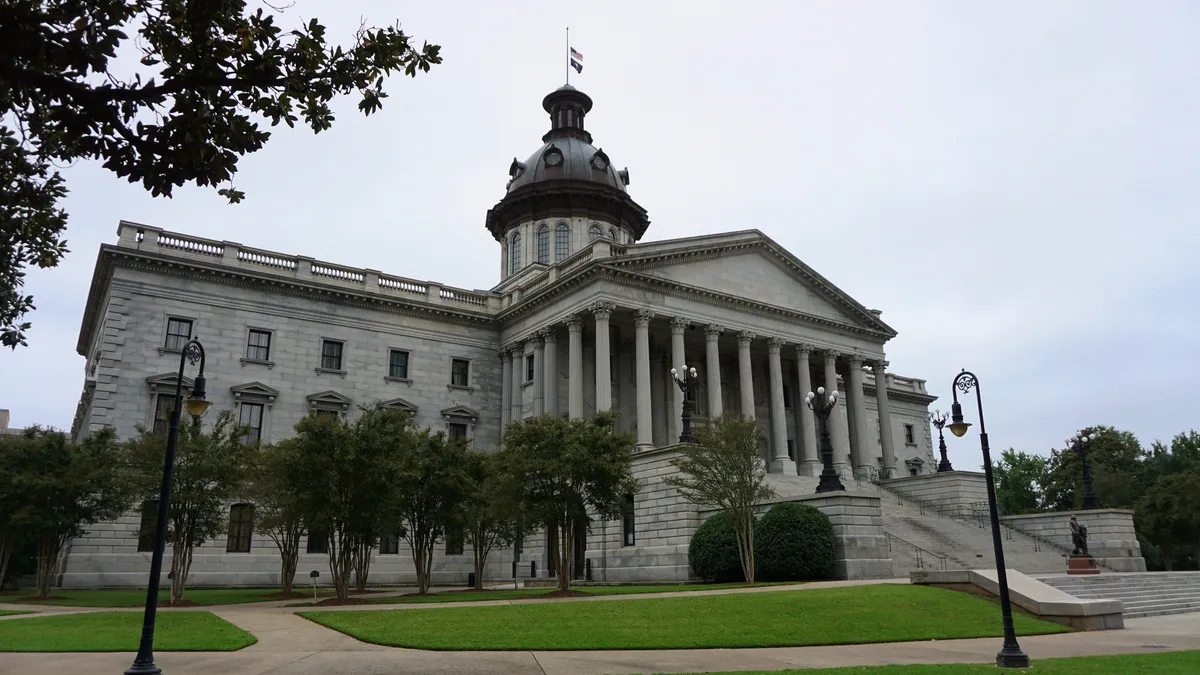UPDATE: Dec. 2, 2021: The national branch of the American Association of University Professors is condemning the legislation that would end tenure systems at South Carolina public colleges.
AAUP deemed the bill "misguided" and said it would irreparably damage the educational quality of the University of South Carolina system by undermining academic freedom. It said that "tenure is not a perk for one class of employees" but rather a safeguard against scholars being dismissed for controversial views or research.
"At reputable institutions of higher education, academic freedom is protected because tenured professors can be dismissed only for reasons related to professional fitness and only after a hearing before a faculty body at which the administration must make its case that the faculty member's conduct or performance warrants dismissal," the AAUP's statement reads.
Dive Brief:
- South Carolina lawmakers are proposing an end to tenure systems at the state's public colleges, a move faculty representatives say strikes against academic freedom.
- A group of 23 Republicans filed a bill for the upcoming legislative session that would prohibit public colleges from awarding tenure to those hired after Dec. 31, 2022. Instead, institutions would only be able offer employment contracts of up to five years.
- The bill would not affect current tenured professors. Tenure systems would cease entirely when employees covered by existing hiring practices no longer work at a public college.
Dive Insight:
South Carolina's General Assembly doesn't convene until January, but lawmakers have already staked out a legislative position that attracted the ire of the American Association of University Professors. The proposal also exemplifies the nationwide trend of state leaders involving themselves in matters historically left to institutions, such as tenure awards.
The bill targeting tenure requires employment contracts to contain a provision allowing colleges to fire those who violate certain policies.
It stipulates that beginning in the 2024-25 academic year, all full-time and tenured faculty must teach at least two courses during each of the fall and spring terms. Starting July 2025, public colleges would also need to report to state officials the number of graduate assistants and faculty they employ, including how many had tenure.
Tenured professors can already be dismissed from their jobs, but only in limited circumstances. Tenure was devised as a lifelong appointment to protect academics and their ability to research and transmit knowledge freely, without worrying controversial speech and positions would cost them their jobs.
The bill's intent is to bring faculty employment in line with other sectors that continually evaluate their workers, said the bill's chief sponsor, state Rep. Bill Taylor.
Tenure systems should be evaluated because of rapid changes in the education world, but that review should not be conducted by academics with potential biases, Taylor said. He likened professors reviewing tenure to Congress putting term limits on itself.
"I get it that tenure is a hallowed tradition in higher education," Taylor said. "But that particular pillar of higher education needs to be examined like everything else."
Taylor said he did not consult the University of South Carolina system or faculty groups before filing the bill. They will share their views during the legislative process, Taylor said, adding he welcomes those "robust conversations."
A spokesperson for the system said it could not comment by publication time Monday.
The AAUP views the tenure bill ー and another one that would limit state-funded entities from promoting "inherently discriminatory" concepts ー as tools to undermine academic freedom, said Shawn Smolen-Morton, president of the faculty organization's South Carolina state conference.
The second bill falls in line with growing conservative animus against critical race theory, a decades-old academic framework that in part teaches racism is systemic. It would ban public colleges from teaching a host of ideas, including that people, by virtue of their race, can contribute to oppression.
The proposals took state education leaders by surprise, Smolen-Morton said. Lawmakers generally have supported but not interfered with the minutiae of higher education, Smolen-Morton said.
"What will stop them from muzzling and constraining discussions of evolution, any social issue, anything they want to politicize?" Smolen-Morton said. "What we're talking about here is basic censorship."
Smolen-Morton fears that these "threats to intellectual freedom" would dissuade students and academics from around the world from coming into the American educational system "because of the political climate."
The AAUP will organize against the bills, Smolen-Morton said.
Tenure-related debates have cropped up in other parts of the country. A Republican-led bill in Iowa that would have banned tenure at the state's three public colleges failed to pass this year. GOP lawmakers said the effort stemmed from concern that those schools were squashing conservative students' viewpoints.
And in Georgia, the public university system reworked policies in a way that critics said weakened tenure. The AAUP is investigating the University System of Georgia over the changes.















